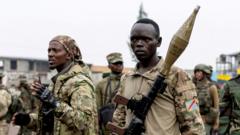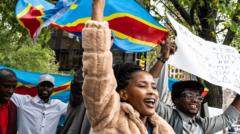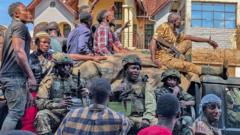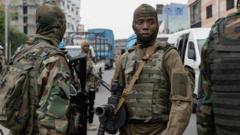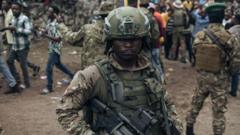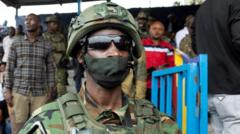The recruitment of nearly 300 Romanian mercenaries to assist the Congolese army ends in failure as they are forced to surrender to advancing M23 rebels, highlighting deep issues within DR Congo's military strategy.
**Romanian Mercenaries' Disastrous Experience in DR Congo's Conflict**

**Romanian Mercenaries' Disastrous Experience in DR Congo's Conflict**
Mercenaries face disillusionment after surrendering to rebels amid violent clashes in Goma.
The recent events in the Democratic Republic of Congo (DRC) have highlighted a troubled partnership between contracted Romanian mercenaries and the national army as they faced off against the M23 rebels in the eastern city of Goma. The near 300 Romanian fighters, hoping to profit from lucrative contracts, were confronted with the grim realities of warfare, culminating in their surrender due to a lack of support from the embattled Congolese military.
This controversial setup was initially marketed with a substantial salary of around $5,000 (£4,000) monthly for the mercenaries, a stark contrast to Congolese soldiers who receive as little as $100. The mercenaries were tasked primarily with assisting the DRC army combat the Rwandan-backed M23 rebels, who claim to fight for the rights of the country's minority ethnic Tutsis.
The situation took a turn for the worse on a Sunday when M23 launched an aggressive assault, overwhelming the national army and forcing the Romanian fighters to take refuge at a UN peacekeeping compound. Constantin Timofti, a coordinator for the Romanian group, conveyed the despair felt among the mercenaries as they realized the Congolese army had retreated from the battle.
According to Romania's foreign ministry, negotiations were rapidly initiated, leading to the Romanian fighters being handed over to Rwandan forces. Remarkably, M23 commander Willy Ngoma confronted one of the mercenaries on camera, emphasizing the differences in their pay and motivations, further complicating the narrative surrounding the conflict.
Part of the issue stems from a lack of clarity regarding the roles played by various military actors in North Kivu province, further muddled by the involvement of multiple international mercenary groups. Whistleblowers within the Romanian contingent have noted disorganization, inadequate military training among recruits, and poor working conditions, leading to disillusionment among the mercenaries, some of whom have previous military experience.
Asnd the operational backdrop is further marred by the ongoing instability in North Kivu, where a diverse array of militias profit from the province's mineral wealth, including valuable resources such as gold. This economic realitys contributes to ongoing recruitment of mercenaries from various nations, often without proper oversight or consideration of their backgrounds.
Despite the magnified expectations surrounding the involvement of mercenaries in DR Congo, local soldiers expressed frustrations regarding their low pay and the prioritization of foreign fighters for support roles. This dynamic raises critical questions regarding the DRC's military strategy and the need for a unified command structure in the fight against M23.
Crisis experts have pointed out that the disjointed nature of military operations in North Kivu has endangered not only the Romanian mercenaries but also the Congolese troops, who often find themselves at the front lines. Observers are urging the DRC government to reform its military approach and streamline its defense mechanisms to avoid further humiliation and loss of life in ongoing conflicts.
As the situation continues to develop, the future of international mercenary involvement in DR Congo remains uncertain, with potential ramifications for both local forces and foreign fighters drawn into the chaos of war.

